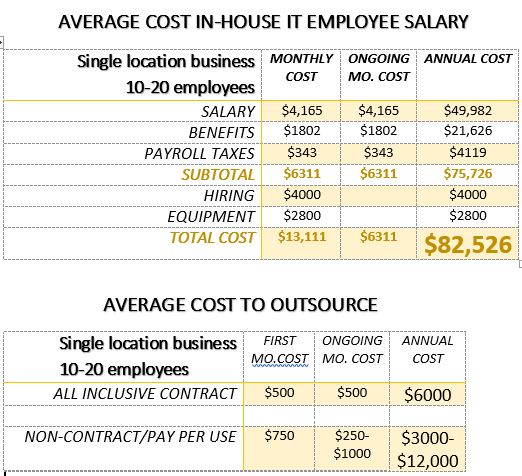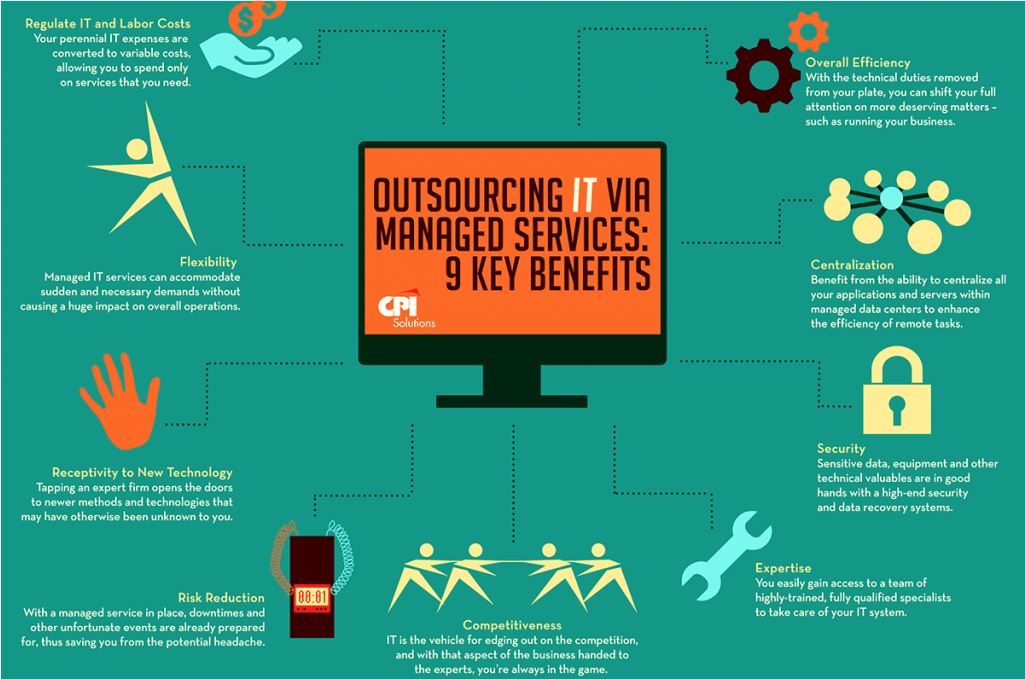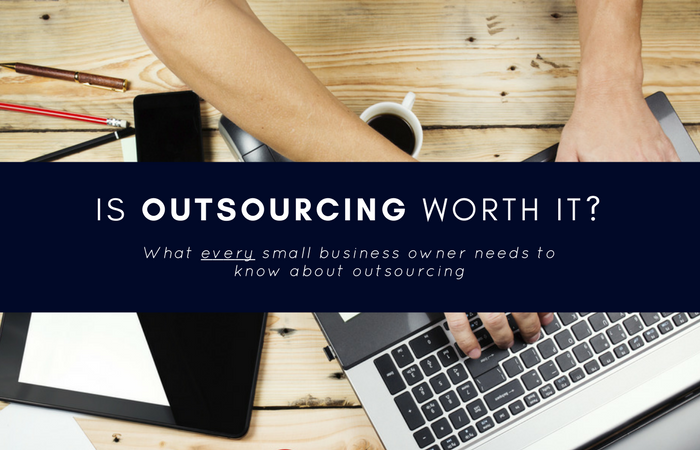To Outsource or Not To Outsource…That Is The Question.

LET’S START WITH A COST COMPARISON OF HIRING IN HOUSE VS. OUTSOURCING:
At some point, every business has to decide which approach to take when it comes to IT – hiring a full-time employee or outsourcing to a MSP. Most SMBs begin running into issues when they opt to have an existing employee handle their IT tasks. Aside from the sheer inconvenience of trying to build and run a network while performing other tasks and assignments, the IT employee is likely not up to date on the latest tech and trends. Hiring a new person can help, but every business owner knows the new hire equals a huge expense – you’ll spend on much more than just an annual salary when choosing to hire an in-house IT staffer.
Here are some of the biggest expenses you’ll face when you hire a dedicated IT staffer for your business:
SALARY COSTS
You’ll need to offer a competitive salary to ensure that you attract a great IT person and a well trained professional commands a high salary; you’ll need to be able to cover this alongside benefits and related perks to be able to justify hiring a quality-dedicated employee.
If your company is big enough to have IT concerns, but not big enough to keep a dedicated staffer busy, you’ll have to find that new hire something to do during their downtime. If you are paying a salary, then you will be paying money every month, whether your employee has enough to keep them busy or not. Coming up with responsibilities that your IT team member can handle when they are not working on your network can be a challenge. Fill the downtime with too many tasks and they won’t be available to do the job you’ve hired them for – striking the right balance between enough IT work and other responsibilities can be a challenge for any business.
BENEFITS AND ONGOING COSTS
A full-time employee costs your business far more than just a regular salary. Health insurance, workers compensation and even 401K matching programs can take a big chunk out of your budget. You’ll also need to make sure that this key employee is up to date on the latest technology and trends; ongoing certification and education costs also take a bite from your budget each year. Opting to use an outsourced team for your IT allows you to place the responsibility and the cost of these big ticket items on a third party. When you outsource your IT, you pay for the services rendered, not for benefits and continuing education for the people running your network.
INTANGIBLE COSTS
When you hire a sole employee to handle your IT, your risk is naturally increased. That employee could get sick, decide to leave or even end up harming your network and business. Even a competent, healthy and loyal worker only puts in about 40 hours a week; network errors don’t always happen on a regular schedule. Having a fully resourced team on call can help you avoid expensive errors and the issues that can crop up when your network is only monitored for a few hours each day.
Turnover can be expensive too – if your new hire leaves, they take all of their institutional knowledge with them, leaving you scrambling to replace them. According to human resource experts at ERE Media, it can cost the equivalent of a year’s salary to replace a key, skilled employee. Opting to outsource your IT means your network is never left unprotected – and that you don’t have to absorb the high costs associated with replacing an employee.
Outsourcing your IT allows you to reap the rewards of having a knowledgeable network expert on your team – without the expense of a new hire. If you are considering expanding and hiring a dedicated IT person, take a good long look at the numbers – salary, benefits and the intangible costs – to determine if a new hire is truly the best course of action for your business.

OUTSOURCING SOUNDING LIKE THE BETTER OPTION YET?…
The number one reason small to medium-sized businesses (SMB’s) choose to outsource their IT needs is so that they experience fewer headaches. This is an oversimplified encapsulation of a complex issue. To make a qualified business decision on whether or not to outsource your organization’s IT, you need to back it up with supporting evidence.
An IT department is a complex environment of hardware, software, & computer networks that allow you to perform important business functions such as accounting & financial processes, customer relationship management, email, & document creation.
Your company’s success depends on it being able to use these functions reliably & efficiently. For example, it is imperative for organizations to send & receive emails to communicate with clients, employees, partners & vendors – to fulfill product & service orders. How long can your business operate without such an important function?
Additionally, you must be able to access customer information & financial data to run your business. To protect these processes, there are many back-end functions that need to be performed including security, anti-virus protection, data backup & recovery, & server monitoring.
With this large, vital undertaking, is it feasible for an SMB to totally take on the tasks & responsibilities necessary to run its own IT department? Not without a sizable commitment & investment in IT talent, infrastructure, money & time. Training IT staff, maintaining IT devices & keeping technology up-to-date are huge burdens for most SMB’s.
Top Benefits To Outsourcing

CONTROL AND REDUCE COSTS 
Outsourcing allows you to control costs by paying a set monthly fee, eliminating any fluctuations. You’re also able to take advantage of their economies of scale, lower cost structures, & learned efficiency & expertise. Funding & running an internal IT department can be extremely expensive. Qualified IT professionals must maintain their level of expertise & be adequately compensated.
MSPs also offer cloud-hosted services.You can rent hardware like servers, have them located offsite & continually monitored, greatly reducing your IT investment. All hardware has an end-of-life expiration- when its performance deteriorates, fails, & needs replacing. Cloud services allows you control & prediction over these costs.
STRATEGIC CONSULTING
With years of experience working with different client companies & industries, as well as keeping current with the latest technology, qualified MSPs will advise companies on their future IT requirements. This is done by evaluating the company’s growth & accompanying IT needs, whether the company plans to move or expand, or enter into new markets.
Technology is constantly changing, making it difficult to ascertain what a company will need in the future & how those needs will translate into dollars. By partnering with an MSP, uncertainties become more predictable.
MINIMIZE RISKS 
MSPs will keep your day-to-day IT environment up-to-date effortlessly by automating the process. They’re constantly verifying that backups are working, pushing out patches, & auditing inventory to minimize the risk of any catastrophes. They also monitor for alerts of unpredictable circumstances such as backup & hardware failures, database corruptions, software crashes, & virus/spyware intrusions, acting quickly to prevent downtime.
A limited in-house IT staff may not be able to respond & resolve issues as quickly, leading to extended downtime & decreased productivity.
INCREASE PRODUCTIVITY 
Because of all of the above benefits, your organization will be able to lower its costs & focus on its core competencies. A qualified MSP can predict, prevent & quickly respond to serious issues that lead to catastrophic failures & extended downtime.
Moreover, you will be using the most current technology that enhances your success & makes you more competitive. With first-class technology, you can streamline processes making them more efficient & productive. Your company will also be able to take advantage of opportunities more quickly.
MOST UPDATED TECHNOLOGY ACCESS
Qualified MSPs bring world-class knowledge & experience to your organization on a continual basis. MSPs, give you access to new technologies & know-how you may not have considered, also, techniques & tools you currently don’t possess. These tools include tried-and-true procedures & processes; documentation; & more structured methodologies.
Additionally, MSPs test the engineers they hire, & maintain their training consistently to keep them up-to-date with the latest tech.
MSPs also bring a wide variety of IT professionals of varying skill sets to take care of a number of situations. If you have your own IT staff, their skill set would be limited to their expertise.
24-7-365 NETWORK MONITORING
Even if you have knowledgeable, qualified IT professionals on staff, with a limited number of staff, it would not be reasonable to have them monitor your IT environment every hour of the day, every day of the year. Qualified MSPs have the tools & staff to do this, & can foresee serious issues with your IT environment before they ever become one.
They’re able to advise you on necessary future upgrades to avoid any future downtime. Are your servers more than three years old? Are you using an operating system that is no longer supported? MSPs can also take care of day-to-day tasks like software updates & patches, anti-virus updates, data backups, & inventory auditing & control.
The peace of mind alone in knowing that your environment is monitored and maintained even when your NOT there, pays for itself.
If you are considering partnering with an MSP to take care of your IT needs, Contact the experts at CCSI. We provide managed IT services to hundreds of companies in the DFW Metroplex and beyond.









